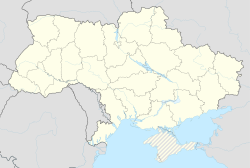Poliske
|
Poliske Поліське |
|
|---|---|
| Urban-type settlement | |

Abandoned administrative building, 2009
|
|
| Location of Poliske in Ukraine | |
| Coordinates: 51°14′27.27″N 29°23′13.11″E / 51.2409083°N 29.3869750°ECoordinates: 51°14′27.27″N 29°23′13.11″E / 51.2409083°N 29.3869750°E | |
| Country |
|
| Oblast |
|
| Raion |
|
| Founded | 1415 |
| Population (2013) | |
| • Total | 20 |
| (ca 12,000 in 1986) | |
| Area code(s) | +380 4592 |
Poliske (Ukrainian: Поліське) or Polesskoye (Russian: Полесское) is an abandoned settlement and former town in the Chernobyl Exclusion Zone, part of Kiev Oblast, Ukraine. It is located on the Uzh River and was an administrative center of Poliske Raion (district). However, later the town was taken out of a registry as it was completely depopulated being located in the Zone of alienation. Currently around 10 people live there, so called samosely ("self-settlers").
Originally called Khabnoye or Khabne' (Russian: Хабное, Ukrainian: Хабне), it was renamed Kaganovichi Pervye or Kahanovychi Pershi (Russian: Кагановичи Первые, Ukrainian: Кагановичі Перші) in 1934, and Poliske in 1957.
Founded in the 15th century, it was the home of the Polish family Horwatt from 1850 to 1918. In the 19th century this small city was known for its weavers and its textile industry. In 1890, 80% of the population was Jewish. In the later half of the 19th century, and in the beginning of the 20th century, there was known a klezmer band of Makonowiecki family. Khabne lost all its major architecture during the Soviet Union - the castle of Radziwiłł, Orthodox churches, and the Catholic Church. In 1938, Khabne received official city status. After the Chernobyl disaster, Khabne's population started to fall off. In 1999, the remaining population was evacuated. In 2005 there were about 1000 people still living there, mostly senior citizens.
...
Wikipedia

